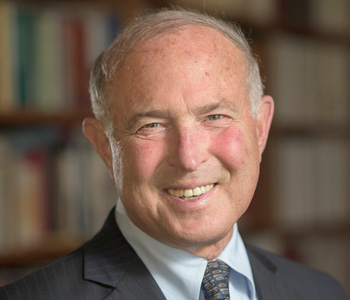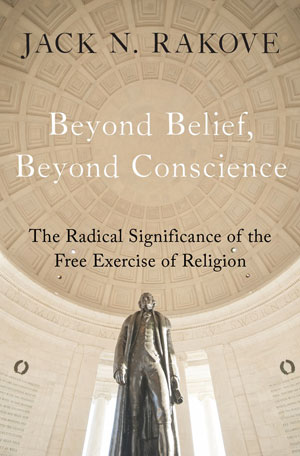
The argument of Beyond Belief, Beyond Conscience rests on two claims about the importance of religious liberty to our broader constitutional tradition. First, of all the rights we possess, the commitment to “the free exercise of religion” is the one that places the greatest emphasis on the moral autonomy of individuals. Most other constitutional rights set standards that government has to meet when it regulates our behavior. The free exercise of religion, by contrast, assumes that in the realm of belief and conscience, government has no right to act at all, unless individuals commit overt acts that infringe the rights of others.
Second, the idea that religion should be disestablished best illustrates the fundamental constitutional principle that government exercises only the power that the people delegate to it. Most other societies assume that religion deserves public support and regulation because it is so essential to maintaining public order and morality. The American position assumes instead that religion will flourish when all religious associations are wholly voluntary and self-sufficient, and that freeing government from a direct connection to religion would prevent its own corruption.
Together these two points identify what I call “the radical significance” of religious liberty. Ordinarily when we discuss this question, we think primarily about how courts resolve the conflicts that still inevitably arise. We are at one such moment today, when we are actively disputing whether state and local governments can restrict and regulate religious services as a necessary measure to combat the Covid-19 pandemic.
Though this book examines leading legal conflicts over the free exercise of religion, its focus is primarily historical in nature. My major concern is to explain why American ideas of religious freedom went further than the comparable efforts of Europeans to develop new modes of religious tolerance to replace the bloody conflicts that accompanied the Reformation. This is not a simple story of how American colonists were always committed to broad principles of religious liberty. The liberty they initially sought was meant for their own particular denominations, not for dissident groups like the Quakers and Baptists (or later, Mormons and Jehovah’s Witnesses) whom mainstream Protestants found so offensive.
Yet by the eighteenth century, freedom of conscience was perceived as a universal right that everyone (men and women alike) possessed. And a commitment to that right was fundamental to the thinking of such leading revolutionaries and constitutionalists as Thomas Jefferson and James Madison, whose thoughts on religious liberty still influence us today. The movement to disestablish religion that Jefferson and Madison pioneered created the thriving marketplace of denominational competition that sets the United States apart from other societies.
Many studies of religious liberty follow one of two paths. One essentially involves a study of ideas, and tries to explain how great thinkers, like St. Augustine, either justified the coercion of religious beliefs or (on the other side of the story) began creating a space where individual rights of conscience could be protected. Here we pay special attention to such writers as John Locke, Baruch (or Benedict) Spinoza, Pierre Bayle, and Voltaire. The second path, particularly for Americans, is concerned with developments in constitutional law and the leading cases that represent the current, often rather muddled state of legal doctrine.
In writing this book, I wanted to have a different emphasis. Part of my original interest in the subject came from my long-running interest (going back to the early 1970s) in the political career and thinking of James Madison. Religious freedom was Madison’s first political commitment, but explaining its impact on his constitutional thinking, and that of his friend and ally, Thomas Jefferson, remained an issue that deserved fuller explanation.
But I was also influenced by recent work done by historians of early modern Europe. Their concern was not with ideas of religious toleration but with practices of religious tolerance that had to be worked out at the community level. Toleration, properly defined, means having to accept something you find truly offensive and burdensome. It is, as one English scholar put it, a form of “charitable hatred.” It is also a legal privilege that the state can extend but also withdraw, which is what famously happened in 1686 when Louis XIV revoked the Edict of Nantes that had protected French Huguenots.
By the middle eighteenth century, and certainly by the Revolution, many Americans believed they had moved “beyond toleration,” and were recognizing religious conscience as a fundamental right that the state must recognize and never revoke. To explain how they had reached this position is one of the challenges this book takes up. Having the European background as a point of comparison makes it easier to appreciate the American achievement.
But one also needs to know more about the nature of American religiosity in an avowedly Protestant society. One of my main arguments is that the emphasis that the Puritans and their spiritual descendants placed on the direct personal experience of religious conversion made the rights of conscience a vital element in American Protestantism, not only in the colonial era but well into the nineteenth and twentieth centuries. And that emphasis enhanced the idea that matters of religious choice had a fundamental importance that scrupulous individuals could never alienate.
I am a linear writer as well as a linear reader (though in suspenseful novels I sometimes look ahead and then get mad at myself for hitting upon some spoiler that I should have prevented myself from learning). So I would be perfectly happy if a reader started at Page 1 of the Introduction, which begins with a key insightful remark by Madison, given in 1822, noting how the experiment in disestablishment had allowed American religion to “flourish in greater purity” without having to rely on the aid of government.
But I also like my own intriguing insight at the start of Chapter 1, “The Burden of Toleration,” that when one lives in a tolerant society, as we do, we no longer know what toleration, properly defined, historically meant.
And Chapter 3 begins by speculating how the American ideas of religious freedom might have evolved had the Revolution not occurred. Of course, the Revolution did occur, and that in turn required Americans to begin writing new constitutions of government to replace their old colonial charters. Here I quote a passage from the reading notes that Jefferson compiled in the fall of 1776, when he first met Madison. Both men were serving on the religion committee of the Virginia House of Delegates and trying to figure out what position the new state should take on matters of religious liberty. Jefferson used the occasion to reread John Locke’s Letter Concerning Toleration, and his notes contain this trenchant remark: “It was good to go so far (as he himself says of the parl[iament] who framed the act of toler[atio]n [of 1689]; but where he stopped short, we may go on” [emphasis added].
Asking what it meant for the Americans to “go on” is an underlying theme of the whole book, so this is also a nice point of departure.
This book is part of the series, Inalienable Rights, edited by my friend and colleague, Geoffrey Stone, of the University of Chicago (which happens to be my literal birthplace). All the other contributors to this series are professors of law; I am the sole historian who is involved in the project. But I happen to think having a historical perspective on what has become a vexed area of jurisprudence has real intellectual advantages. Many legal observers regard Religion Clause doctrine as a mess, and that situation makes it difficult to appreciate what a great success the radical American departure embodied in the First Amendment has been.
The basic fact remains, I believe, that Madison and Jefferson (and to some extent Madison more than Jefferson, as I explain in the book) were right: the more one does to enable individuals to be their own religious truth-seekers and to maintain a high wall of separation between church and state, the happier we will collectively be. This book does offer a short summary in its concluding two chapters of the leading issues of Religion Clause jurisprudence, though emphasizing “free exercise” more than disestablishment. But its real purpose is to provide a historical context for appreciating and, I hope, validating the American experiment in religious freedom.


Jack Rakove is the William Robertson Coe Professor of History and American Studies and Professor of Political Science, emeritus, at Stanford University, where he began teaching in 1980. He is the author of eight books, including Original Meanings: Politics and Ideas in the Making of the Constitution (1996), which won the Pulitzer Prize in History, and Revolutionaries: A New History of the Invention of America (2010), which was a finalist for the George Washington Prize.